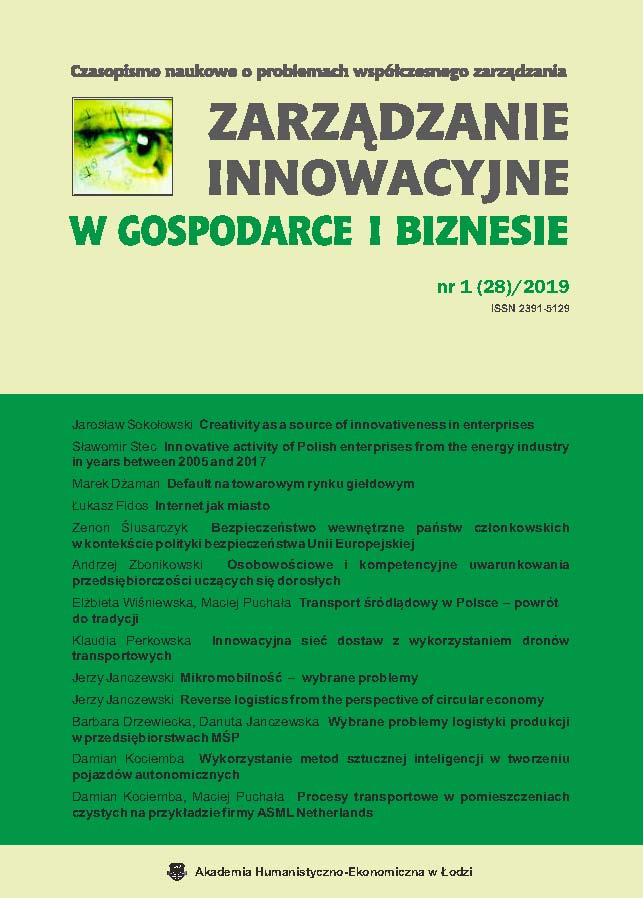Reverse logistics from the perspective of the circular economy
DOI:
https://doi.org/10.25312/2391-5129.28/2019_10jjKeywords:
reverse logistics, circular economy, after-sales logistics, after-use logistics, consumer logisticsAbstract
Apart from providing many advantages to enterprises, reverse logistics also minimises their negative environmental impact, which in the fullness of time translates into advantages for the whole society. Supply chain management is a linear partnership which uses classic methods of analysis of needs and forecasting. That technique was very effective in the past, and, although it might still be used in some companies, the growing number of requirements from business environments expects more productive and flexible processes and precise planning of all movements, both the traditional and reverse ones. It is not insignificant here that the next wave of logistics is approaching, the so-called consumer logistics, following on from global logistics. The characteristic feature of economically developed and rich societies is their excessive consumption and the fact that in a very short period of time they are able to use up more resources than nature is able to reprovide. For that reason, the concept of a circular economy is becoming more and more important, as well as the closed loop economy that originates from it, supported by processes and operations of reverse logistics.
References
Balfour B. (2019), Effective Reverse Logistics: Protecting the Bottom Line and Gaining Competitive Advantage, https://www.supplychainbrain.com/blogs/1-think-tank/post/29681-effective-reverse-logistics-protecting-the-bottom-line-and-gaining-competitive-advantage [access: 15.05.2019].
Consumer logistics (2019), https://www.definitions.net/definition/consumer+logistics [access: 17.05.2019].
Gołembska E. (2019), Logistyka w gospodarce światowej, Wydawnictwo C.H. Beck, Warszawa.
Jak zgarnąć pełną pulę w logistyce zwrotnej (2011), https://www.erp-view.pl/artykuly-wms/26316-jak-zgarn-pen-pul-w-logistyce-zwrotnej.html [access: 7.04.2019].
Janczewski J. (2016), Logistyka zwrotna w łańcuchu dostaw, „Zarządzanie Innowacyjne w Gospodarce i Biznesie”, No. 2(23).
Ku gospodarce o obiegu zamkniętym: program „zero odpadów dla Europy” (2014), Komunikat Komisji do Parlamentu Europejskiego, Rady Europejskiego Komitetu Ekonomiczno-Społecznego i Komitetu Regionów, https://eur-lex.europa.eu/legal-content/PL/TXT/?uri=CELEX:52014DC0398 [access: 15.04.2019].
McIntosh K. (2019), How Circular Economies Fight Poverty, https://www.borgenmagazine.com/how-circular-economies-fight-poverty/ [access: 17.05.2019].
Miller M. (2016), Internet rzeczy. Jak inteligentne telewizory, samochody, domy i miasta zmieniają świat, Wydawnictwo Naukowe PWN, Warszawa.
Nowicka K. (2017), Rozwój świata wirtualnego i jego wpływ na e-mobilność, [in:] J. Gajewski, W. Paprocki, J. Pieriegud (eds.), E-mobliność: wizje i scenariusze rozwoju. Publikacja Europejskiego Kongresu Finansowego, Centrum Myśli Strategicznych, Sopot.
Pikoń K. (2018), Gospodarka obiegu zamkniętego, Wydawnictwa Politechniki Śląskiej, Gliwice.
Rimmer P.J., Kam B.H. (2018), Consumer Logistics: Surfing the Digital Wave, Edward Elgar Publications, Australia.
Rogers D.S., Tibben-Lembke R.S. (1998), Going Backwards: Reverse Logistics Trends and Practices, University of Nevada, Reno Center for Logistics Management, Reverse Logistics Executive Council.
Sadowski A. (2010), Ekonomiczne i ekologiczne aspekty stosowania logistyki zwrotnej w obszarze wykorzystania odpadów, Uniwersytet Łódzki, Łódź.
Starostka-Patyk M. (2016), Logistyka zwrotna produktów niepełnowartościowych w zarządzaniu przedsiębiorstwami produkcyjnymi, PWE, Warszawa.
Taylor M. (2019), Tiny East Timor to become world’s first plastic-neutral nation, http://news.trust.org/item/20190517054413-vltja/ [access: 18.05.2019].
Downloads
Published
Issue
Section
License
Copyright (c) 2019 Akademia Humanistyczno-Ekonomiczna w Łodzi

This work is licensed under a Creative Commons Attribution-ShareAlike 4.0 International License.

